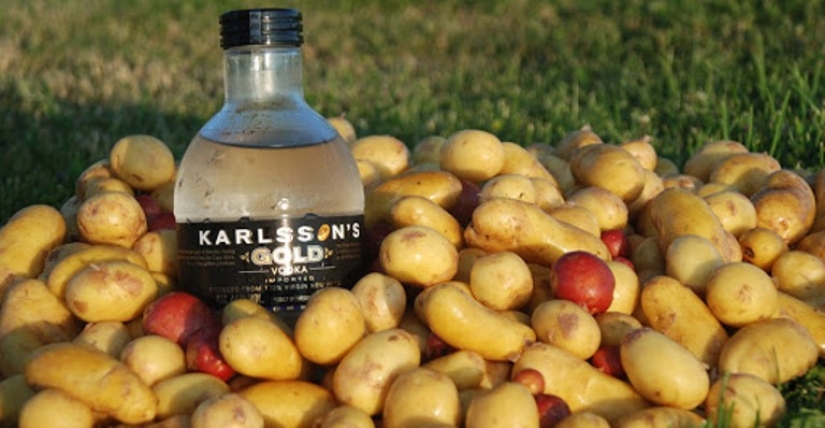10 myths about vodka, in which we unconditionally believe
Categories: Food and Drinks
By Pictolic https://pictolic.com/article/10-myths-about-vodka-in-which-we-unconditionally-believe.htmlLike whiskey for the Scots and tequila for the inhabitants of Mexico, vodka has become a national alcoholic drink for the Russians. Vodka, pancakes, red caviar, a bear and a balalaika – from this set of stereotypes about Russia, you can throw out any item except vodka. It is not surprising that this alcoholic drink is overgrown with myths and legends, in which there is much more fiction than real facts. Let's talk about 10 common myths about vodka, in which we all willingly believe.

Almost everyone is sure that the authorship of vodka belongs to the great Russian chemist Dmitry Ivanovich Mendeleev. The scientist actually worked with alcohols, but not at all as components of beverages. Mendeleev studied the compounds of alcohol and water in terms of specific gravity and concentration.

In fairness, it should be noted that Mendeleev still had a relationship with alcoholic beverages, although indirectly. The chemist worked for some time as the chairman of the subcommittee on the regulation of the production and sale of weak alcoholic beverages. But for some reason this did not become a reason to associate it with beer. Mendeleev himself, by the way, did not drink vodka at all.
Since vodka is the national drink of Russia, we have been drinking it since time immemorial. This is about how the majority of Russians and all foreigners think. But this is not so – in the times of Ancient Russia and later they drank wine, honey and liqueurs. Vodka began to be in demand relatively recently, already in the 19th century.

In Ancient Russia, they could not drink vodka in any way, since this alcoholic beverage was formed as a separate product only in 1895. Before that, alcohol was diluted with water "to taste" and vodka, it is very difficult to call such solutions with non-standard characteristics.
There is a strong opinion that the best vodka is made exclusively using alcohol obtained from grain. Rice, potato, corn and other vodkas cannot claim premium quality and standard taste. This is not so – the source of alcohol production is not important, if the technology is not violated.

This can be confirmed by the fact that tasters cannot distinguish grain vodka from potato vodka by taste. Modern methods of producing alcohols have minimized the value of raw materials. By the way, in 2010, English potato vodka was recognized as the best vodka in the world.
This common misconception is expensive for consumers of a hot drink. In fact, companies that produce vodka very rarely make alcohol for it themselves. They prefer to buy it at distilleries, where its wholesale price is, on average, 60 rubles per liter. One liter of ethyl alcohol makes five bottles of vodka.

It is alcohol that determines the quality of the product, since the other components, if there are any, for example, water, sugar, honey, soda, can not seriously affect the price of alcohol. Experts say that the difference between elite and cheap vodka can be so insignificant that even tasters do not notice it. We always overpay for the brand, bottle and advertising.
You can often hear that vodka was invented in Russia because of the too harsh climate. It is believed that it helps to keep warm in the cold. But this is just an illusion that cost many people their lives. When a person comes into a room from the street and drinks a glass of vodka, he really warms up. This is due to the fact that the heartbeat increases and blood circulation increases.

But this does not work in the cold – although blood circulation increases, it does not give any effect due to the fact that the capillaries of the skin open and the energy generated is not spent on warming, but simply leaves the body. This phenomenon, on the contrary, contributes to hypothermia and is dangerous for humans.
Although vodka is in great demand in Russia, it cannot be called an exclusively Russian alcoholic drink. Nowadays, vodka is produced in dozens of countries, and is drunk all over the world. We are not even among the leaders in terms of both production and consumption.

Foreigners highly appreciate the compatibility of vodka with different dishes, its democratic price, as well as the fact that it, with moderate use, does not cause serious morning consequences. In fact, a hangover from high-quality vodka is much less destructive than from whiskey or gin.
Earlier, in the era of the Soviet shortage, there were no claims to vodka and this product was coveted and respected. But with the advent of a wide selection of other strong drinks, such as cognac, whiskey, tequila, absinthe, vodka has moved into the category of second-class products.

Such an attitude to vodka can be noted only in our country, which has relatively recently gained access to an assortment of alcohol. All over the world, vodka is a noble pure drink that should be consumed skillfully and knowing a lot about snacks. Another myth that is very tenacious is that only alcoholics drink vodka in one gulp. The very essence of this drink is to drink it in one gulp – this is the only correct way.
Many people believe that stress should be removed by all means with alcohol and that vodka is best suited for these purposes. But studies have shown that it is the least suitable as an antidepressant. Yes, if you drink 30-40 milliliters of the drink, you can feel how the emotional and physical tension goes away, but if you overdo it, then the next day you can get a completely opposite effect.

It should also be noted that regular relaxation with the help of vodka is the surest way to alcoholism and related depressions, lack of motivation, general decline in strength. Therefore, it is better to deal with stress with the help of physical exertion, a healthy diet and communication with friends.
There is a large category of people who claim that a glass of vodka before going to bed guarantees a quick fall asleep and a good night's rest. Let's start with the fact that alcohol acts differently on everyone, and if vodka guarantees falling asleep for someone, then someone, on the contrary, will get anxiety and a full head of stupid thoughts.

But if vodka provides you with a sound sleep, you should not think that it is healthy and regenerating. A forty-degree drink causes dehydration of the body, which entails a whole string of unpleasant consequences for the body. It is strange that someone can consider this state a good rest.
Finally, we have saved the most persistent and widespread myth about the bactericidal properties of vodka. Each of us has heard more than once that vodka kills germs and helps to recover faster or not even get sick. Unfortunately, the strength of this alcohol is not enough to resist most dangerous bacteria, not to mention viruses.

Vodka actually kills some microorganisms, but among them are not only dangerous, but also useful. A good libation is always a serious blow to the intestinal microflora, which, as you know, it forms the immune system. Yes, sometimes it seems that people who drink do not take colds and other ailments, but what we see is rather the lack of a normal reaction of the body to dangerous microbes.
Yes, a hangover may soon disappear as a phenomenon – a non-intoxicating vodka, accidentally created in Russia, allows you to keep your mind clear and cheerful in the morning.
Keywords: Alcohol | Russian Federation | Drinks | Traditions | Russians | Vodka | Food and drinks | Ancient Russia
Post News ArticleRecent articles

It's high time to admit that this whole hipster idea has gone too far. The concept has become so popular that even restaurants have ...

There is a perception that people only use 10% of their brain potential. But the heroes of our review, apparently, found a way to ...
Related articles

An old tradition to eat alcohol, kebabs, sausages and other meat products obviously there for a reason. Our ancestors, having a ...

Beloved by many, actor Mikhail Boyarsky has always been distinguished not only by his cheerful disposition and desperate, sometimes ...

Now it is possible not to stare helplessly alcoholic map in search of familiar words, and immediately ordered the waiter desired ...

New Year's is a time to surprise and delight loved ones not only with gifts but also with a unique presentation of the holiday ...